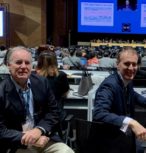DNA reveals the past and future of coral reefs
New DNA techniques are being used to understand how coral reacted to the end of the last ice age in order to better predict how they will cope with current changes to the climate. James Cook Univer

From 2005 to 2022, the main node of the ARC Centre of Excellence for Coral Reef Studies was headquartered at James Cook University in Townsville, Queensland (Australia)








Abstract
Climate change is the fastest-growing global threat to the world’s natural and cultural heritage. No systematic approach to assess climate vulnerability of protected areas and their communities has existed – until now. The ‘Climate Vulnerability Index’ (CVI) is scientifically robust, transparent and repeatable, and has now been applied in various World Heritage properties. The CVI systematically assesses vulnerability through a risk assessment approach (after IPCC) considering the key values of the area, and then assesses the economic, social and cultural aspects of the associated community. This includes evaluating the adaptive capacity of both to future changes. Climate impacts are increasingly adding to a wide range of compounding pressures (e.g., increasing tourism, infrastructure development, changing land-use practice) that are affecting places, people, customs and values. Applications of the CVI to-date have led to intentions to integrate outcomes into relevant management plans, and to periodically repeat the process enabling responsive management to changing future circumstance. The CVI has also demonstrated its potential applicability for other types of protected areas. The CVI engages local community members in identifying key climate drivers and impacts, aids communication about key climate issues to a wide range of stakeholders and provides opportunities for adaptation and impact mitigation within the community.
Biographies
Dr Scott Heron is a Senior Lecturer in Physics at JCU in Townsville. Scott’s research focus is on coastal and near-shore environmental physics, involving the synthesis of physical information with the biological and/or chemical characteristics of the environment. His current work investigates impacts on coral reefs, including coral bleaching and disease, reef resilience and conservation management, within the context of climate change. This work continues from Scott’s time with the US government’s NOAA Coral Reef Watch program, with whom he remains affiliated.
Jon Day is completing a post-career PhD in the Centre at JCU in Townsville. Jon had 39 years of professional experience as a protected area planner and manager, 28 years of which were in the Great Barrier Reef. As a GBRMPA Director for 16 years, he was responsible for matters including biodiversity conservation, commencing and coordinating the Representative Areas Program (the rezoning program for the entire GBR), all heritage matters (including World Heritage) and developing the 2009 Outlook Report. Prior to that Jon worked for Victorian, Queensland, Northern Territory and federal government protected area agencies.
New DNA techniques are being used to understand how coral reacted to the end of the last ice age in order to better predict how they will cope with current changes to the climate. James Cook Univer
A new study on the effects of climate change in five tropical countries has found fisheries are in more trouble than agriculture, and poor people are in the most danger. Distinguished Profess
James Cook University researchers have found brightly coloured fish are becoming increasingly rare as coral declines, with the phenomenon likely to get worse in the future. Christopher Hemingson, a
Researchers working with stakeholders in the Great Barrier Reef region have come up with ideas on how groups responsible for looking after the reef can operate more effectively when the next bleaching
Abstract: As marine species adapt to climate change, their heat tolerance will likely be under strong selection. Individual variation in heat tolerance and its heritability underpin the potential fo
Abstract: The Reef Ecology Lab in KAUST’s Red Sea Research Center explores many aspects of movement ecology of marine organisms, ranging from adult migrations to intergenerational larval dispersal
Abstract: Macroalgal meadows are a prominent, yet often maligned component of the tropical seascape. Our work at Ningaloo reef in WA demonstrate that canopy forming macroalgae provide habitat for ad
Abstract: Sharks are generally perceived as strong and fearsome animals. With fossils dating back at least 420 million years, sharks are not only majestic top predators but they also outlived dinosa
Abstract: Connectivity plays a vital role in many ecosystems through its effects on fundamental ecological and evolutionary processes. Its consequences for populations and metapopulations have been
Abstract: Evolution of many eukaryotic organisms is affected by interactions with microbes. Microbial symbioses can ultimately reflect host’s diet, habitat range, and even body shape. However, how
Abstract: The past few years have seen unprecedented coral bleaching and mortality on the Great Barrier Reef (GBR) but the consequences of this on biodiversity are not yet known. This talk will expl